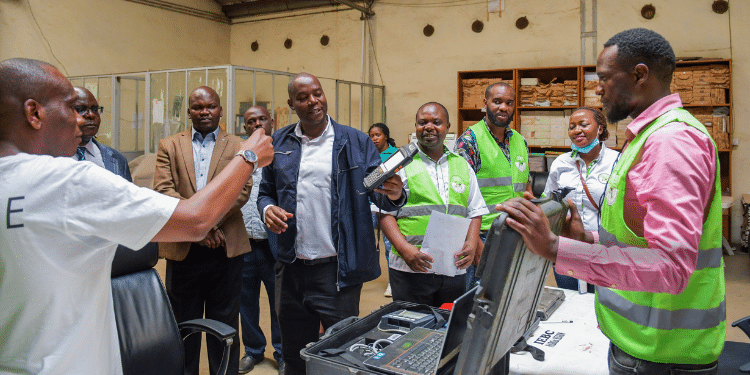Choosing between a diploma and a degree in nursing is a crucial decision for Kenya Universities and Colleges Central Placement Service (KUCCPS) eligible students aspiring to join the healthcare sector.
Each path offers unique qualifications and career opportunities that can shape one’s future in nursing.
This guide explores the key differences between a diploma and a degree in nursing, helping students make informed choices based on their academic performance, financial ability, and long-term career goals.
For KUCCPS eligible students, a nursing diploma requires a minimum grade of C+ in specific KCSE subjects (English or Kiswahili), Mathematics or Physics, Chemistry, and Biology.
Diploma vs Degree in Nursing for KUCCPS Students
Diploma holders can also pursue a Bachelor of Science in Nursing by upgrading, which often requires a two-year working experience and Nursing Council of Kenya registration.
Nurses provide hands-on care, monitoring patients’ conditions, administering medications, and assisting with daily needs.
They also spend the most time with patients, ensuring their well-being and comfort around the clock.
Additionally, they act as the voice of patients, ensuring they receive appropriate care, understand their treatment plans, and have their concerns addressed by doctors and healthcare teams.
BSC in Nursing
The Bachelor of Science in Nursing aims to equip nurses with the knowledge, skills, attitudes, and competencies needed to excel as clinical practitioners, educators, and researchers.
It provides a broader, more specialized education. It focuses on broader nursing curriculum with an emphasis on research, leadership, and advanced critical thinking.
The program trains nurses to provide effective patient care, health education, and leadership in nursing practice, administration, education, research, and publication.
Graduates should be capable of working in diverse healthcare settings, providing care for the sick, and promoting the health of individuals, families, and communities.
After successful completion in the programs offered in this department, graduates have a chance to join the vast industry and venture into most if not all the opportunities this field has to offer.
KUCCPS Admission Requirements
To qualify for a Bachelor of Nursing, candidates must have a KCSE mean grade of C+ in KCSE or be a holder of K.A.C.E. with 2 (two) or more Principal passes, one each in Biology and Chemistry or any other qualifications accepted by the University Senate as equivalent to any of the above.
Additionally, an applicant must have a C+ in Chemistry, a C+ in Biology, and at least a C+ in either Physics or Mathematics. Additionally, a C+ is required in either English or Kiswahili.
Alternatively, admission may be granted to outstanding diploma holders from recognised nursing colleges.
Such candidates must: hold a diploma with credit or distinction from such Colleges.
Be supported in their application by a statement from the principal of that college to the effect that their performance in the diploma course was exceptionally good and that their understanding of basic sciences is such that they will be able to benefit from a degree course.
Also Read: How Students Choose KUCCPS Courses for TVET and University Placement
Diploma in Nursing
A Diploma in Nursing is a promising career path and is offered at Kenya Medical Training Colleges (KMTC) across the country.
The Diploma in Nursing is a practical, entry-level qualification designed to prepare students for immediate patient care.
It takes approximately 3 to 3.5 years to complete and focuses on hands-on experience, ensuring that students are equipped to handle various healthcare settings.
Its focus is on general nursing skills and knowledge, enabling practice as a registered nurse.
A diploma can be a steppingstone to a Bachelor of Science Nursing degree (BSN), but a BSN provides a stronger foundation for advanced studies.
Requirements
To be admitted into KMTC or other institutions offering this course, applicants must have a Mean Grade of C in the Kenya Certificate of Secondary Education (KCSE).
Additionally, a grade C is required in English or Kiswahili, Biology/Biological Sciences, and a C- in one of the following: Chemistry, Physics/Physical Science, or Mathematics.
The course combines classroom education with clinical rounds, giving students real-world experience.
Students also participate in community health practical learning in local communities around the school, helping them understand the healthcare needs of diverse populations.

Higher Diploma in Nursing
Meanwhile, one can also pursue a Higher Diploma in specialized areas such as Kenya Registered Nurse Anesthesia, Critical Care Nursing, Pediatric Nursing, and Psychiatric Nursing.
Other possible areas of specialization include Ophthalmic Nursing, Nephrology Nursing, Palliative Care Nursing, Perioperative Nursing, Family Health Nursing, and Oncology Nursing.
Requirements
To pursue a Higher Diploma in Nursing in Kenya, one must hold a Diploma in Nursing such as Kenya Registered Nurse (KRN), Kenya Registered Community Health Nurse (KRCHN), Kenya Registered Nurse Midwife (KRNM), or Kenya Registered Nurse Mental Health and Psychiatry (KRNMHP).
Additionally, the applicant must be registered by the Nursing Council of Kenya (NCK), possess a valid practising license, and have at least one year of post-licensing clinical experience.
Career opportunities exist in hospitals, clinics, academic institutions, and more, with degree holders potentially advancing to specialized roles like nurse practitioners.
Diploma program provides an opportunity for graduates to secure employment in government hospitals, private healthcare facilities, or even international health organizations.
Places That Offer Career Opportunities
Hospitals/Clinics
Travel Companies
Academic/Learning Institutions
Home Healthcare Agencies
Public Health organizations
Pharmaceutical Companies
Job Titles Graduates can Acquire in this Field of Career
- Nurse Researcher
- Pediatric Nurse
- Nurse educator
- Nursing Informatics Analyst
- Certified Dialysis Nurse
- Nurse case Manager
- Nurse Practitioner
School Fees
A nursing course at KMTC costs Ksh 83,700 for the first one year. This includes Ksh 44,700 for Semester One and Ksh 39,000 for Semester Two.
Most public universities in Kenya charge Ksh 275,400 per year for a Bachelor of Nursing.
Diploma in renal nursing at Uon costs Ksh 259,000 while a higher diploma for the same course costs Ksh 194,000.
| KUCCPS Listed University | Annual Fee (Ksh) |
|---|---|
| Maseno University | 275,400 |
| Kirinyaga University | 275,400 |
| Masinde Muliro University of Science & Technology | 275,400 |
| University of Embu | 275,400 |
| Chuka University | 275,400 |
| University of Kabianga | 275,400 |
| Southeastern Kenya University | 275,400 |
| Meru University of Science and Technology | 275,400 |
| Murang’a University of Technology | 275,400 |
| Moi University | 275,400 |
| Kenyatta University | 275,400 |
| Alupe University | 275,400 |
| Kibabii University | 275,400 |
| Maasai Mara University | 275,400 |
| Kaimosi Friends University | 275,400 |
| Pwani University | 275,400 |
| Kenyatta University – Mama Ngina University College | 270,000 |
| Egerton University | 307,340 |
| University of Nairobi | 324,000 |
| Dedan Kimathi University of Technology | 340,000 |
| Kabarak University | 382,950 |
| Kisii University | 316,710 |
| JKUAT | 316,710 |
| Uzima University | 274,300 |
| Daystar University | 343,100 |
| St. Paul’s University | 229,550 |
| Kenya Methodist University | 239,500 |
| Mount Kenya University | 250,500 |
| Catholic University of Eastern Africa | 188,200 |
| Presbyterian University of East Africa | 251,700 |
| Kenya Highlands Evangelical University | 252,625 |
| Great Lakes University of Kisumu | 222,000 |
Also Read: KUCCPS Nursing Course Cluster Points, Requirements, and Fees Across Universities
Expected salaries of Nurses in Kenya
In Kenya, the lowest-paid nurses fall under Job Group G. Public service salaries are structured into 18 job groups, ranging from Group A (the lowest) to Group T (the highest).
Entry-level nurses in Job Group G earn between Ksh23,369 and Ksh29,826.
Those in Job Group K receive a basic salary of approximately Ksh45,000, while nurses in Job Group R earn between Ksh109,089 and Ksh144,928.
Salaries also vary based on a nurse’s academic qualifications and place of work. For instance, nurses working in Intensive Care Units (ICUs) can earn a basic salary of around Ksh129,000.
Diploma-holding nurses typically earn upwards of Ksh70,000, and those working at Kenyatta National Hospital (KNH) earn an average of Ksh 68,000.
Nurses also enjoy the following allowance benefits:
- House allowances of Ksh. 3,500-Ksh. 15,000,
- Extraneous expenses Ksh. 15,000-Ksh. 35,000 depending on the job group,
- Health risk allowance Ksh. 3,850-Ksh. 5,000,
- Uniform allowance Ksh. 10,000 annually,
- Commuter allowance Ksh. 4,000-Ksh. 14,000.
Follow our WhatsApp Channel and X Account for real-time news updates.








































































